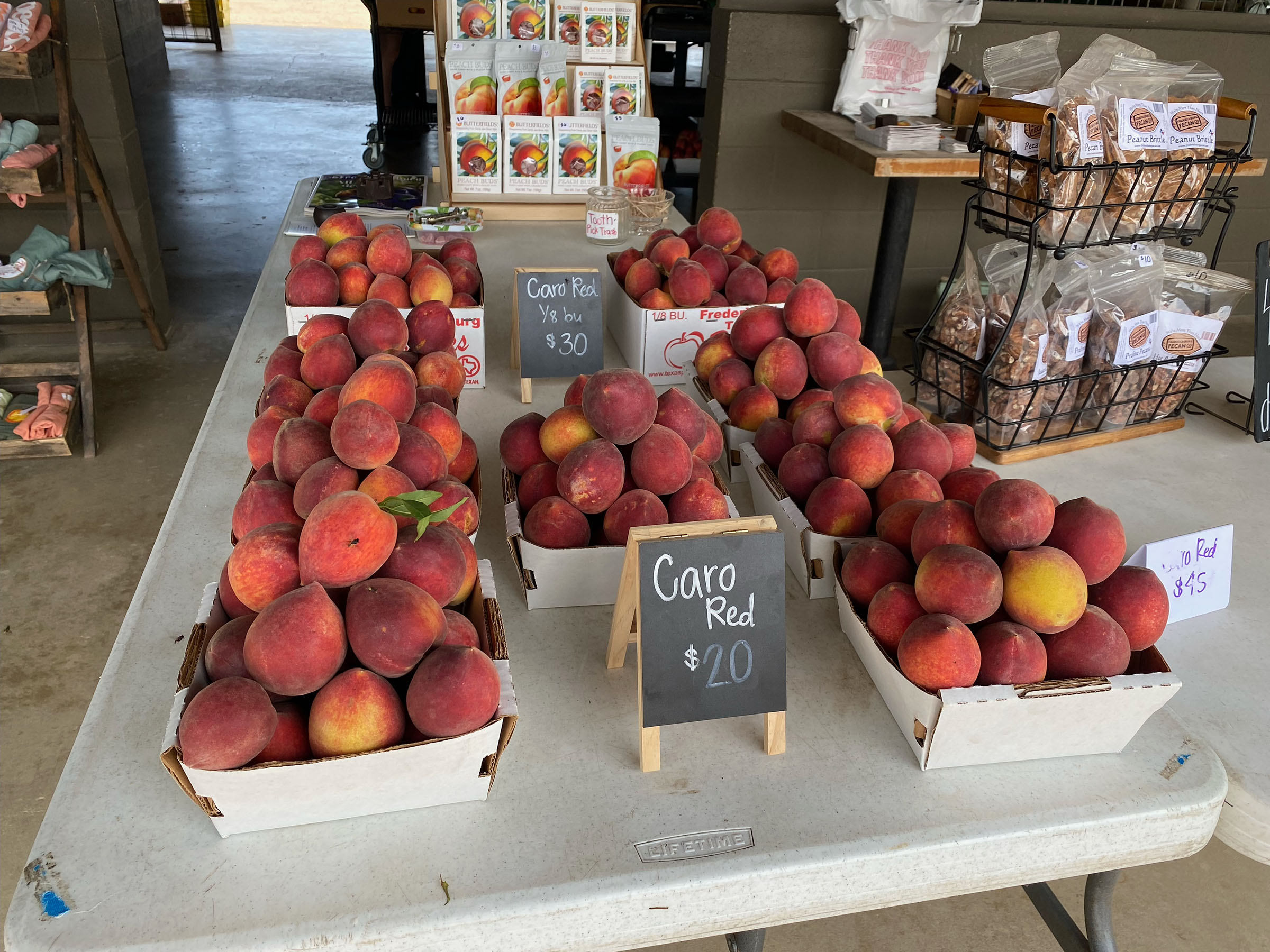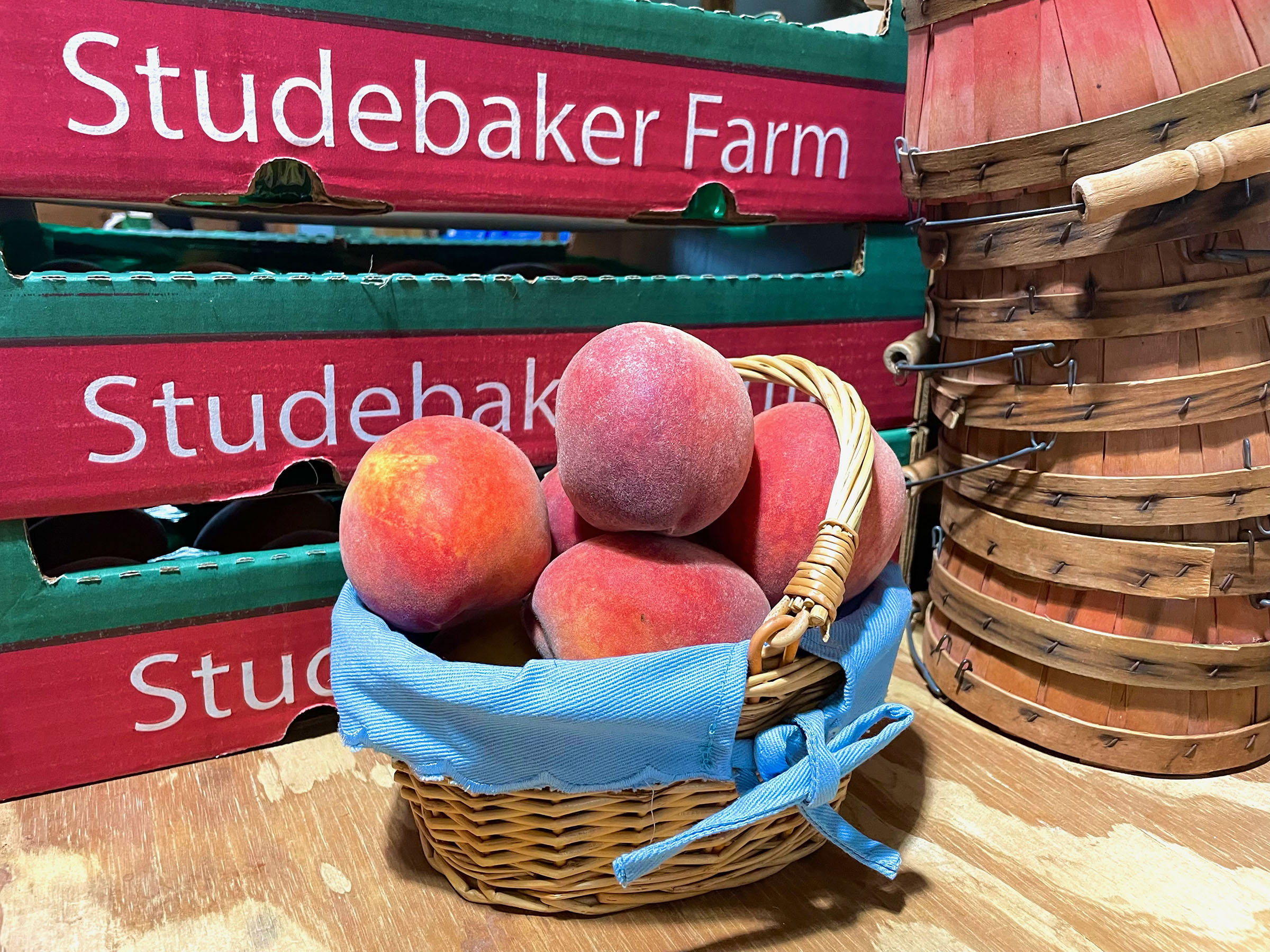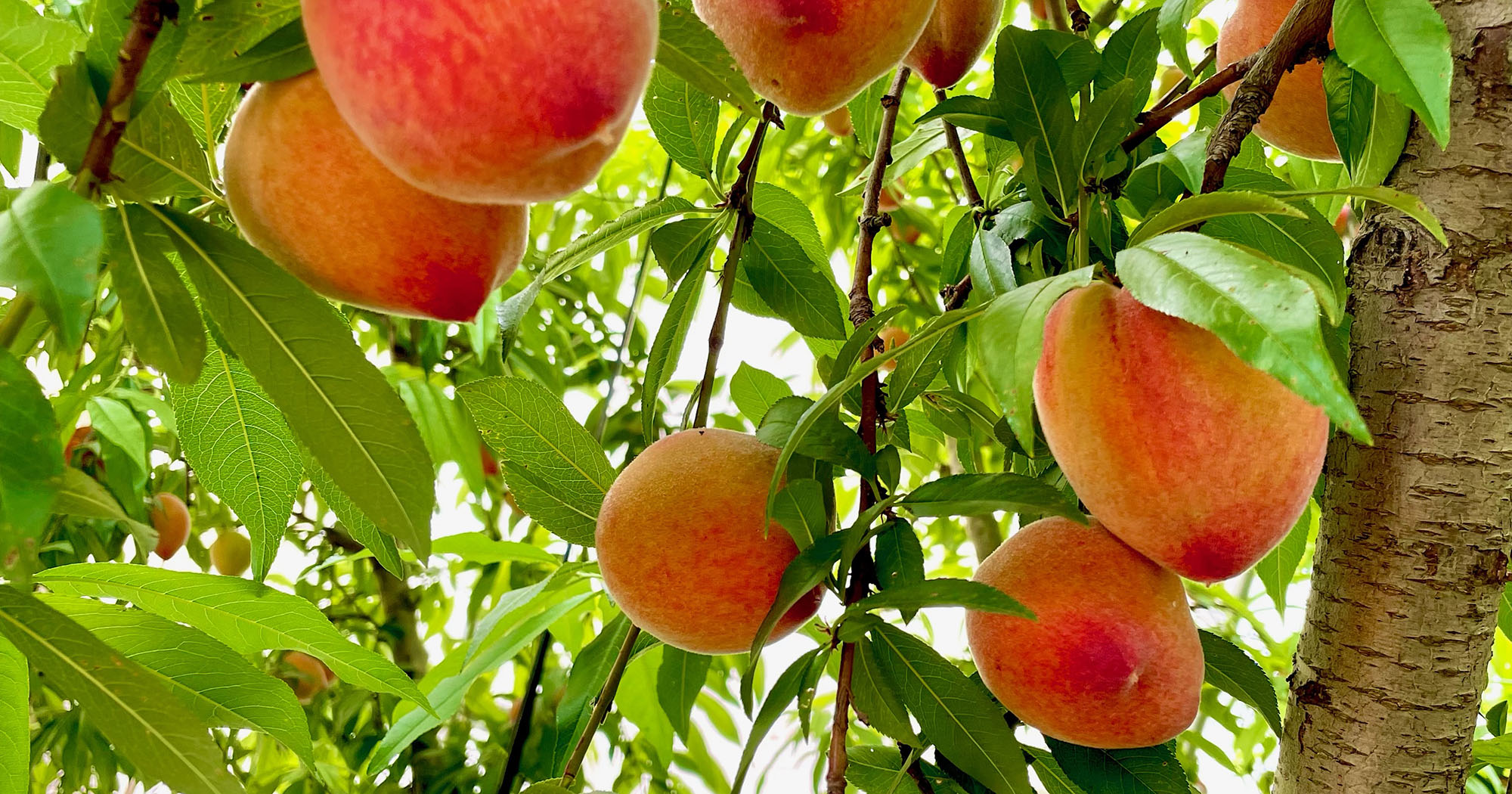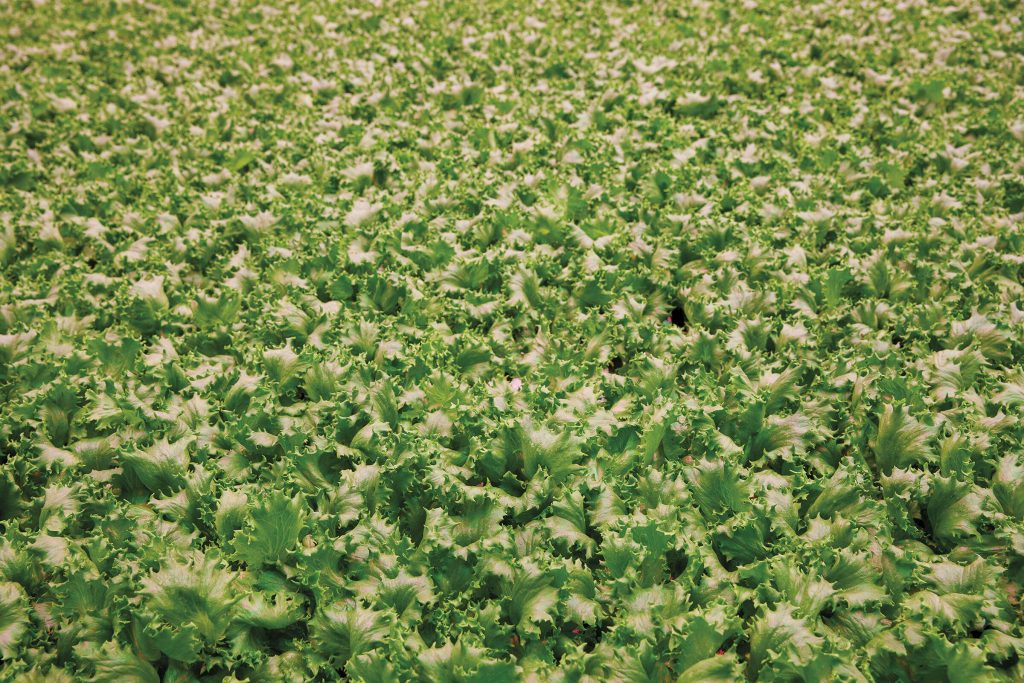
Don’t dawdle if you are planning your 2023 excursion to Texas’ popular family-owned peach orchards. A mild winter, late freeze in some areas, and last year’s drought have combined to dim prospects for widespread availability of cherished freestones in late June and July. But earlier varieties, which have a reputation for being less attractive, are relatively plentiful in roadside stands and stores now.
“People don’t realize there’s nothing inferior about these early peaches,” says Elizabeth Johnson, who with husband Brady operates 300-acre Cooper Farms and its country store in Fairfield, located on Interstate 45 between Dallas and Houston. “I would put any of the varieties we are picking now up against a freestone variety any day as far as taste, size, and juiciness go.”
That said, you might have to work a little harder to peel, cut, and separate the meat in the clingstone peaches that are being picked as Memorial Day weekend approaches. “As far as just eating them—absolutely no difference at all,” Johnson says. “I can’t wait for the day that people realize this.”
Alerted to this year’s early crop conditions, my wife, Eileen, and I visited what we call “Peach Alley” on Mother’s Day weekend. This stretch along U.S. 290 between Johnson City and Fredericksburg is where decades-old family-owned orchards persist among the latest Hill Country winery openings.
Our weekend started with a visit to Cabernet Gill in Fredericksburg, where Chef Ross Burtwell made use of early peaches from Vogel Orchard. We enjoyed the chilled buttermilk and peach soup (see sidebar for recipe) and an experimental appetizer of seared peaches and goat cheese (a delightful pairing).
Ready to stock up on peaches, we made our first stop at Jenschke Orchards. Patrons crowded the farm store complex east of Fredericksburg for barbecue, Tex-Mex, peach cobbler, and baskets of smallish but juicy Caroreds and more prolific and sweeter Regals. Both of these clingstone varieties were almost sold out by the time we arrived. Before our trip, owner Barrett Jenschke let me know that they expect to have peaches all season, but volume usually takes a big hit starting mid-June, with smaller-size box options tending to sell out daily.
“Low chill hours are definitely the main cause for this, coming off last year’s drought,” he said, referring to growers’ annual angst over the required duration of temperatures below 45 degrees Fahrenheit for blooms of Texas’ traditional peach varieties to set and bear fruit. A low amount of chill hours yields a smaller crop of the vaunted mid- and late summer freestones that many Texans value.

Early season peaches for sale at Studebaker. Photo courtesy Studebaker Farms
Next, we met Russell and Loriann Studebaker at their Studebaker Farms stand, which features a relic of a Studebaker truck out front. Inside awaited trays of nicely colored, full-bodied TexKing peaches, a clingstone patented by Texas A&M University scientists in 2002 to address a lack of chill hours. The ripest ones sliced easily to the pit and peeled with fingertips, perfect for topping a bowl of oatmeal later that week.
“We normally couldn’t grow them here because they start blooming in January,” Russell said of TexKings, “so we have to protect them with high tunnels.” Studebaker uses high tunnels (arches of plastic that shield the blooms from deep freezes and springtime hailstorms) for a hybrid of open-air in-ground cultivation and cover about 2,000 of the farm’s 5,000 trees, including some later-arriving freestones that could help make Studebaker’s an exception this season to freestones’ limited availability.
“I was a little depressed about freestones the first time I went out and started checking them,” said Russell of this year’s crop. “Then I went out there again and I’ve started getting more optimistic every time I looked. In Texas, every year is an adventure.”
Studebaker’s succulent TexKings are part of the body of work of Dr. David Byrne, who has led A&M’s stone fruit research program for four decades, focusing on new peach varieties that address Texas’ annual vagaries in weather, especially the years with low chill hours. Growers like Cooper and Studebaker are making major commitments to convert more of their trees to new varieties of low-chill peaches like clingstone and semi-freestone for a new business model with Texas A&M’s help.
“We saw the writing on the wall 10 to 12 years ago with the low-chill issues, and the traditional varieties we were growing weren’t cut out to handle that,” said Johnson at Cooper Farms, which hosts one of Byrne’s experimental plots. “This is a special year for us because it’s the first year we are harvesting large volume out of an orchard that was planted and designed for a low chill year.”
Texas Hill Country Peach Harvests Through the Years
Kristen Restani manages Burg’s Corner, the farm store in Stonewall that is the outlet for Duecker Orchards. As a member of the latest generation of Duecker family peach farmers, she offers her perspective about recent years of growing Texas peaches. Texas Highways reports from those years expand on what she says.
2022
“Our crop set a good volume—some of the sweetest peaches we have ever grown; however, they were some of the smallest peaches we had seen. That was directly due to the extreme drought.”
2021
“Probably been the best crop our family has ever had in 50-plus years of raising peaches. It was directly attributed to the cold weather we received that February and the abundance of rain that came throughout the spring and summer. Cold weather affects SO much – the leaf set, peach size, even the peach’s skin quality.”
2020
“Just weird like everything else. Our crop did set a decent amount. Despite COVID, the store was open with the addition of curbside. We actually had a great year that season due to the amount of people who started shopping ‘small business’ and not traveling as far from home.”
2019 and ’18
“[These years] were also decent crops (bigger than 2023). In the world of farming, that is really pretty good odds.”
Editor’s note: Also see Texas Highways 2019 profile of Texas family peach orchards
Recipe: Hill Country Buttermilk Peach Soup
Serves four or five as an appetizer
Ingredients:
1 ½ cup buttermilk
¾ cup heavy cream
1 teaspoon orange zest
1 ounce fresh squeezed lime juice
6 Fredericksburg peaches, peeled, pitted and pureed.
¼ cup granulated sugar
1 cup apple juice
1/8 cup dry sherry
2 teaspoons candied jalapeños, minced (optional)
2 tablespoons chopped toasted pecans
Preparation:
1. Mix all ingredients except jalapeños and pecans together and place in refrigerator to chill.
2. Place soup cups and spoons in refrigerator to chill as well.
3. Serve soup in chilled cups and garnish with a little candied jalapeño and pecans.
Recipe by Chef Ross Burtwell, published with permission from Cabernet Grill in Fredericksburg

Meanwhile, it wouldn’t be peach season without Texas’ two major peach festivals. The Stonewall Peach JAMboree takes place June 15-17 and features a parade on Saturday and its traditional dance and rodeos on Friday and Saturday nights, along with baking contests, the coronation of the annual Peach Queen, and vendors selling peaches, peach cobbler, and peach ice cream. Then, on July 8, downtown Weatherford west of Fort Worth forges ahead with the Parker County Peach Festival. With an estimated attendance of 40,000 in 2022, this festival offers 200 arts, crafts, food, and activity booths and live music on two stages.
Parker County’s primary grower, Hutton Peach Farm, opens Memorial Day weekend with Flavorich clingstones for sale. “We had such dry weather last year that affected our trees, so some of them didn’t set as much,” said Gary Hutton when I spoke to him in mid-May. “But we still have quite a few peaches.” Noting timely rains this spring, he is more optimistic about offering freestones this summer than others.
In Stonewall, Kristen Restani, manager of Burg’s Corner on U.S. 290, offered her assessment. “Folks still have time to load up on Hill Country peaches,” she said. “We are still harvesting our semi-freestone varieties such as Regal and June Gold…Through Memorial Day weekend, we should have half-bushels available.”
The first freestone variety, Harvester, “has the best set of our freestones and they are expected to be out the last two weeks of June,” she predicted, adding that later-arriving freestone varieties may only be available in small quantities.
She also brought up other reasons to visit Hill Country fruit stands. “Our family has added a few new things that return customers may not have gotten to try, one being peach wine,” she said. Burg’s version, Peach Shenanigans, is “quite a lovely peach wine with an authentic peach flavor, which is attained by using fresh peach juice.”
Nearby, Vogel Orchard’s early season supply is strong enough to offer shipping. “This is the time to buy your larger quantity of peaches,” said owner Jamey Vogel in a recent online update. “So, come buy your peaches now to freeze or can later! We will have smaller quantities for our later varieties, so don’t wait for those.”
My spouse and I took him at his word, taking home robust and tender Regals picked the day before. Vogel’s big news was the addition of 3,250 new trees since 2020 to the 5,000 already in production. They were planted on what his daughter and daughter-in-law call “virgin orchard land,” acquired by Vogel’s late father and maintained as grassland.
“This is the only time in my life I can plant trees on land that never had a fruit tree before,” said Vogel, whose parents planted their first peach trees 70 years ago. “You are not going to buy land in the Hill Country right now for this—it’s not cost effective, not viable.”
The new trees are “all varieties that had a history with us as good producers and good quality peaches.” Starting with a blank slate, the project also addresses variances in annual harvests caused by changes in Texas weather. “The varieties overlap from beginning to end of season to provide consistent supply throughout,” he said.
Stay tuned. According to Vogel, with the right conditions, some of the new trees could begin producing next year.
In the Pits
Where to find up-to-date news on peaches across Texas
For the latest information on availability at Burg’s Corner, Copper Farms, Jenschke Orchards, Studebaker Farms, and Vogel Orchard, check the growers’ frequent Facebook posts. Hutton Peach Farm can be checked by calling the farm store at 817-594-1273. Hutton also operates the Weatherford Farmer’s Market. In Terrell east of Dallas, Ham Orchards reports enough supply to sell half bushels of early peaches and overall “about a 70 per cent crop,” according to family manager Richard Strange, who adds most varieties “look good for the later season right now.”
A listing of additional Hill Country orchards can be found at the Hill Country Peach Council website here. Two other significant family peach operations, Efurd Orchards in Pittsburg and Lightsey Farms in Mexia, report good quantities of early varieties. Lightsey notes its produce is also available at farmers’ markets in Houston, Waco and Austin.
In the Pits
Where to find up-to-date news on peaches across Texas
For the latest information on availability at Burg’s Corner, Copper Farms, Jenschke Orchards, Studebaker Farms, and Vogel Orchard, check the growers’ frequent Facebook posts. Hutton Peach Farm can be checked by calling the farm store at 817-594-1273. Hutton also operates the Weatherford Farmer’s Market. In Terrell east of Dallas, Ham Orchards reports enough supply to sell half bushels of early peaches and overall “about a 70 per cent crop,” according to family manager Richard Strange, who adds most varieties “look good for the later season right now.”
A listing of additional Hill Country orchards can be found at the Hill Country Peach Council website here. Two other significant family peach operations, Efurd Orchards in Pittsburg and Lightsey Farms in Mexia, report good quantities of early varieties. Lightsey notes its produce is also available at farmers’ markets in Houston, Waco and Austin.








